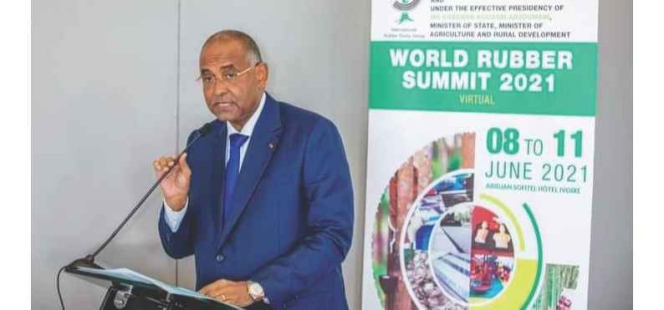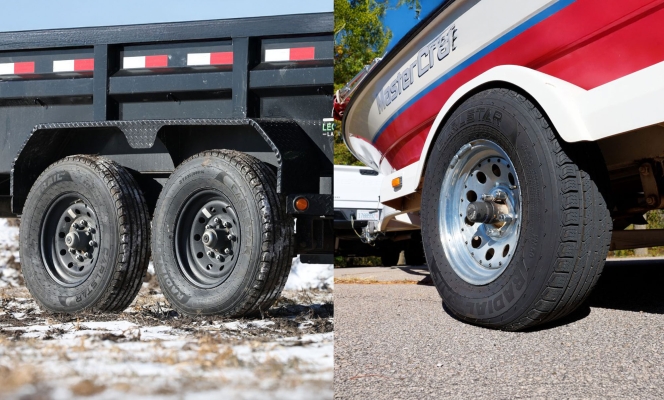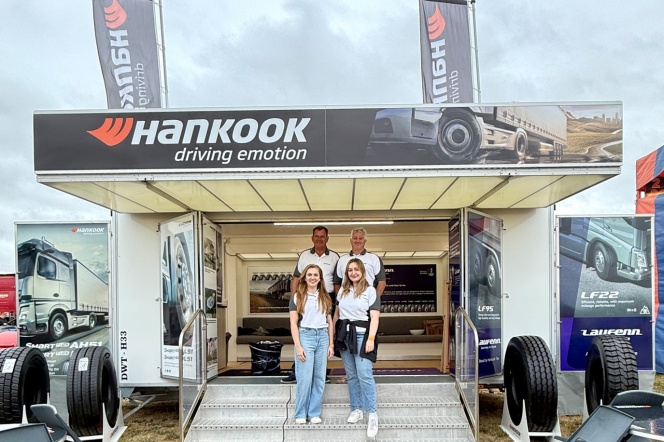
The WRS 2021, organised by IRSG (International Rubber Study Group) together with the Ministry of Agriculture and Rural Development of the Government of Côte d’Ivoire and co-hosted by the Association des Professionales du Caoutchou Naturelle de Côte d’Ivoire (APROMAC) the Fonds Interprofessionnel pour la Recherche et le Conseil Agricoles (FIRCA), was a prime opportunity for leaders, experts, government representatives and NGOs to discuss the current status of the rubber industry and explore the way forward to achieve sustainable and inclusive growth. This year’s WRS featured the very timely theme, ‘Facing the Future: Inclusiveness, Sustainability and Growth for the Next Normal’.
The WRS 2021 was officially opened by HE M. Jerome Patrick Achi, Prime Minister, Government of Côte d’Ivoire, in recognition of the important role that Africa can play as an emerging producer of natural rubber. The event has highlighted that the rubber economy could be a formidable engine for the continent, creating jobs and transforming its economic and social prospects, and providing opportunities for the youth and women – real key drivers of sustainable growth, development and peace.
The WRS 2021 witnessed 29 eminent speakers from all parts of the world, about 200 participants directly linked to the virtual platform and significant public participation in Côte d’Ivoire, where stakeholders in the rubber sector interacted in person during the event.
Innovative ideas and approaches emerged during the summit to address the new challenges that can change the global pattern of production and consumption in the rubber sector, market and policy discussions on new approaches in business and life to turn the crisis into an opportunity from the lessons learnt. Discussions around the decarbonisation commitment of governments justifying sustainable and secure supply chains for raw materials were focussed on supply chain collaboration, ensuring that raw material efficiency, performance and traceability are dealt with holistically.
An important debate took place on the impact of climate change on natural rubber systems, which has potential economic, environmental and social risks, identifying a set of policy recommendations that could facilitate the work of all stakeholders in the rubber value chain.
The latest IPCC report , published in August 2021, has highlighted that human activity is changing the climate in an unprecedented and sometimes irreversible way. Actions on the adaptation of natural rubber systems to climate changes are urgently needed and further investigations into the potential contribution of rubber to climate change mitigation.
Work-based on scientific knowledge is the precondition to identifying correct pathways to preserve and support the growth and prosperity of the natural rubber economy worldwide. In this field, IRSG has had a leading role thanks to the support of important R&D organisations such as CIFOR/FTA, IRRDB and CIRAD.
In his closing remarks, Salvatore Pinizzotto, Secretary-General IRSG, has pointed out that the main common point that emerged during the World Rubber Summit is the need to formulate policies and put into place people-centred actions. “If we look at the natural rubber sector alone, it sustains 40 million people with their families around the globe with a supply chain generating more than USD 300 billion. Furthermore, about 90 percent of the total world natural rubber production is sourced by smallholders.
“To build an inclusive and sustainable rubber community, we need to work at local, national and international level – there is not a ‘one-size-fits-all solution – putting in place innovative forms of cooperation across national borders and a variety of actors – governments, business, academia and civil society. Reduce poverty-establishing mechanisms that could provide smallholders with an adequate income level, implement an effective technology transfer on the field and support education and training among farmers, especially young people and women. These are some of the policies needed to implement sustainability. Leveraging digital technology in farming and green finance options encouraging climate change adaptation are other key policies to assure emission reduction and social inclusion."
In closing the World Rubber Summit 2021, the Honourable KobenanKouassiAdjourmani, Minister of Agriculture and Rural Development, Government of Côte d’Ivoire, has strongly stated that Africa is completely committed to implementing sustainability practices in the rubber sector, making sure that all the rubber value chain is equitable, profitable and transparent.
"Sustainability and circular economy are two aspects that we need to keep high on the agenda of all stakeholders in the rubber economy. We need to make sure that both natural and synthetic rubber sectors comply with the adopted 2030 Agenda for Sustainable Development." (TT)
- Titan International
- Titan Radial Trail A/T
- Titan Radial Trail HD
- All-Terrain Trailer Tyres
- High-Speed Trailer Tyres
Titan Launches Radial Trail A/T And Unveils Speed Rating Upgrade For Radial Trail HD
- By TT News
- March 05, 2026

Titan International has introduced the Radial Trail A/T, a new all-terrain high-speed trailer (HST) tyre described as the first true product of its kind in the industry. Unlike conventional trailer tyres that are often adapted from older light truck designs, this model has been engineered entirely from the ground up as a dedicated trailer tyre capable of performing reliably across diverse environments. Alongside this launch, Titan has announced a speed-rating upgrade to its established Radial Trail HD tyre.
The new Radial Trail A/T tyre’s field-tested design incorporates an aggressive tread pattern for enhanced traction on gravel, mud, grass and uneven backroads. The tyre also features a centre tread bridge that lowers rolling resistance to support better fuel efficiency and towing stability. Shoulder tread bridges promote even wear and extend the tyre’s lifespan while reducing road noise, and an open shoulder configuration helps dissipate heat and shed debris. Alternating scoops improve control on soft surfaces such as sand and mud, and extended tread elements along with a rim guard offer added protection against scuffs and impacts. The Radial Trail A/T is currently available in size ST235/75R15 LRE, with four additional sizes expected to roll out over the summer.
Now carrying an N speed rating, which allows for operation at speeds up to 87 mph (approximately 140 kmph), the updated Radial Trail HD tyre incorporates heat-resistant engineering to deliver reliable performance under demanding conditions while surpassing Department of Transportation standards. The enhanced Radial Trail HD tyres are available for order immediately.
Both product releases reflect Titan’s continued focus on advancing trailer tyre technology through purpose-built solutions. Whether used for long highway journeys or off-road exploration, these tyres aim to provide drivers with improved traction, durability, and dependability. Together, they represent the company’s broader effort to support trailer owners with greater confidence and peace of mind on the road.
Ryan Fuller, High Speed Trailer Product Manager, Titan Specialty Division, said, “Titan is setting a new standard in high-speed trailer tyre performance. The Radial Trail A/T is the first trailer tyre truly engineered for all-terrain conditions, not adapted from outdated moulds. Combined with the enhancements to the Radial Trail HD, we’re giving our customers unmatched confidence whether they’re hauling down highways or navigating rugged backroads.”
- Continental
- 2026 Tire Technology Awards
- Tire Manufacturer of the Year
- Environmental Achievement of the Year – Manufacturing
- Sustainability
Double Win For Continental At 2026 Tire Technology International Awards
- By TT News
- March 05, 2026

Continental has once again been recognised as ‘Tire Manufacturer of the Year’ at the latest edition of Tire Technology International Awards for Innovation and Excellence, marking the fifth time it has received this prestigious honour. The independent jury acknowledged the company's groundbreaking tyre technologies, innovative measurement approaches and continuous production process enhancements for establishing new industry standards. Additionally, Continental received the ‘Environmental Achievement of the Year – Manufacturing’ award for its substantial progress in reducing water consumption during tyre production.
During the 3 March ceremony in Hannover, the jury specifically highlighted several key developments from Continental's 2025 initiatives. The company advanced sustainability through the adoption of renewable synthetic rubber components, including pyrolysis oil recovered from end-of-life tyres and recycled cooking oil. A collaborative effort with the Technical University of Braunschweig yielded an innovative method for detecting tyre wear particles using a specialised vacuum system positioned behind drive wheels, equipped with sensitive particle sensors capable of identifying even microscopic airborne debris from various vehicle locations.
The VanContact A/S Eco received special recognition as the first van tyre to achieve the highest ‘A’ rating across all three EU tire label categories – rolling resistance, wet grip and rolling noise. Continental's partnership with the Deutsche Gesellschaft für Internationale Zusammenarbeit promoting responsible natural rubber sourcing in Indonesia also earned jury commendation.
Between 2020 and 2025, Continental successfully reduced water withdrawal per metric tonne of product by over 10 percent across all production facilities, conserving an impressive 197 million litres of water. This achievement resulted from implementing advanced filtration and membrane technologies that enable approximately 90 percent of wastewater to be treated and reused. The company maintains a comprehensive water management approach, systematically refining processes related to heating, cooling and sanitation. External validation of these efforts came through a ‘B’ rating from the independent organisation CDP for Continental's 2025 water management practices.
Edwin Goudswaard, Head of Research and Development at Continental Tires, said, “Tyres are our passion. We are committed to optimising them and making our manufacturing processes even more advanced and resource-efficient. Our greatest strength is our global team, working together closely to develop highly creative and innovative solutions. The jury honoured this very special commitment. And I would like to express my heartfelt thanks to all our colleagues for their remarkable dedication.”
Henning Mühlenstedt, Head of Future Technologies and Sustainable Infrastructure at Continental Tires, said, “Water is a valuable resource. Our continued progress in reducing consumption at our plants demonstrates how effective our approach is.”
TRA Announces 2026 Briefing Day Focused On Circular Economy
- By TT News
- March 05, 2026

The Tyre Recovery Association has confirmed that its 2026 TRA Briefing Day will take place on 15 September 2026 at the Coombe Abbey Hotel in Coventry. The event, themed Giving REAL Meaning to the Circular Economy, will provide essential insights into the challenges and opportunities currently facing end-of-life tyre recycling both in the UK and globally.
Now an annual fixture, the Briefing Day aims to bring together industry professionals to discuss key developments in the sector. Attendance is free of charge for TRA members, media representatives, industry partners and regulators. For all other participants, a fee of GBP 70 plus VAT will apply, which includes access to a buffet lunch and refreshments throughout the day.
Those interested in attending are encouraged to register in advance by contacting the TRA office via post, telephone, email or through the association’s website. The event promises to deliver valuable updates and analysis for all those involved in the tyre recovery and recycling industry.
Hankook Confirms Partnership As Sponsor For Convoy Truck Shows 2026
- By TT News
- March 04, 2026

Hankook has confirmed its partnership for the 2026 Convoy Truck Shows, stepping in as an infield partner for the series, which runs in tandem with the British Truck Racing Championships (BTRC). These events offer a distinctive fusion of high-octane track action and the immersive atmosphere of a large-scale truck gathering. This renewed involvement deepens Hankook’s footprint at some of the most eagerly awaited dates on the UK motorsport and haulage calendar.
The season’s schedule commences with Convoy on the Plain on 16–17 May, followed by Convoy Cymru on 20–21 June. The flagship gathering, Convoy in the Park, will round off the summer season on 8–9 August. Attendees can look forward to a full agenda of British truck racing, breathtaking stunt performances, live entertainment and attractions for all ages, alongside a remarkable display of working vehicles, custom rigs and pristine show trucks. Mirroring its sponsorship of the Devon Truck Show, Hankook’s partnership with the Convoy series supports its wider mission to generate substantial donations for local charitable causes and community groups, positioning it as an event with purpose beyond spectacle.
At each of these shows, Hankook will spotlight its cutting-edge range of commercial and consumer tyres. Key exhibits will feature the SmartFlex AH51 for steer axles and the SmartFlex DH51 for drives, both engineered for long-haul and regional use and prized for superior traction and extended durability. Also on show will be the SmartFlex TH31 trailer tyre, the Vantra Transit summer tyre for commercial vans and several models from the Laufenn portfolio, such as the LZ22 all-weather drive tyre, the LF21 all-position tyre and the robust LF95 trailer tyre.
Rounding out the display are the Dynapro HP2 all-season SUV tyre and the iON evo SUV, a cutting-edge summer tyre purpose-built for electric vehicles, underlining Hankook’s forward-looking approach to sustainable mobility. Through its involvement in the Convoy Truck Shows, Hankook reinforces its dedication to the haulage industry by engaging directly with drivers, fleet operators and enthusiasts, showcasing tyre innovations focused on safety, efficiency and peak performance, all while actively contributing to valuable community initiatives.
Event Director Mike Quartley said, "We’re thrilled to have Hankook Tyre UK return as an official sponsor of the Convoy Truck Shows. After the success of last year’s collaboration, continuing the partnership was an easy decision for us. Hankook’s commitment to the industry and to our events adds real value across the board – from contributing to the scale and quality of the events to elevating the atmosphere and experience for our audience. We’re proud to be building on this relationship as the Convoy series continues to grow.”







Comments (0)
ADD COMMENT